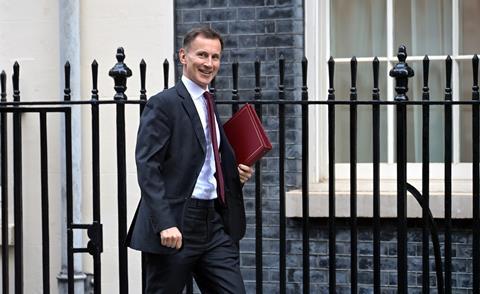Industry welcomes investment in London but is disappointed by lack of significant measures to boost residential development
The residential development industry has given a mixed reaction to the chancellor’s Spring Budget, in which the most eye-catching measure for the sector was a reduction in the tax-rate charged on the profits from the sale of houses.
Chancellor Jeremy Hunt said that he was reducing the rate of capital gains tax on charged on house sales from 28% to 24%, while at the same time abolishing a tax relief on stamp duty used by landlords when making bulk purchases.

Hunt also announced a £240m investment in housing projects in Barking Riverside and Canary Wharf, which he said would together deliver around 8,000 homes and a life-sciences hub.
Hunt billed his statement as a tax-cutting budget, even though tax bills are still set to rise for many people because of the freeze in personal allowance thresholds, and said that the government’s independent economic forecaster, the OBR, now predicted that inflation will fall to its 2% target level a year earlier than previously expected.
The chancellor said in the Budget documents that his actions on housing were designed to boost housing supply now, and show real progress on the government’s Long-Term Plan for Housing.
Hunt said the abolition of the Multiple Dwellings Relief, which was in part designed to support the growth of the build to rent sector, followed an external evaluation “which showed no strong evidence the relief is meeting its original objectives of supporting investment in the private rented sector”.
Nicky Stevenson, managing director at national estate agent group Fine & Country, said reducing the higher rate of Capital Gains Tax “should inject some extra energy into the housing market” by increasing the number of properties for sale.
“Teetering landlords unsure about whether to take the plunge and sell their property will be encouraged by this announcement,” she added.
Full Budget 2024 coverage
Key housing measures at-a-glance
Housing sector sounds alarm over build to rent tax hike
Reaction round-up: disappointment over lack of measures to boost supply
However, Mark Washer, chief executive of Sovereign Network Group, said the failure to announce more radical measures to the human and financial cost of the now 142,000 children living in temporary accommodation was “a massive missed opportunity”.
He said: “The negative impacts of this will be felt for years to come. Whoever delivers the next budget must stop the tinkering and treat housing as national infrastructure that can deliver a huge productivity, health, and wellbeing boost to lift the whole country over the term of the next parliament with a legacy lasting generations.”
Mike Burton, land director at Metis Homes, said the budget was “rather disappointing” and “did very little for the housing industry as a whole”.
Measures include:
- £240m to unlock up to 7,200 homes in Barking and a new life sciences hub and up to 750 homes in Canary Wharf
- £20 million investment in social finance to build up to 3,000 community-led homes and improve capacity of local groups
- £4m for the Euston Housing Delivery Group to support plans to deliver up to 10,000 new homes around the HS2 terminus
- Confirmation that a new development corporation in Cambridge will receive funding from the next spending review, plus £10.2 million to support the Cambridge Biomedical Campus
- A second round of the Local Nutrient Mitigation Fund, designed to help restart schemes totalling 30,000 homes stalled by the nutrient neutrality crisis
- A change to Capital Gains Tax designed to support the housing market, cutting the higher rate for residential property disposals from 28% to 24%.
- £3m to match industry funding for a programme to attract more planners to take up roles in local authorities
- Abolition of Multiple Dwellings Relief, a bulk purchase relief in the Stamp Duty Land Tax regime
He said: “The lack of any incentive for those trying to get onto the housing ladder is a great loss. That is the area we see as most challenging in the housebuilding industry, and most likely to hamper growth.”
A Fair Deal for Housing

Housing Today’s A Fair Deal for Housing campaign is calling for the government to launch a review to look how to increase affordable housing delivery to 100,000 homes a year.
This should consider overhauling existing funding for affordable housing so that a more ambitious programme can be delivered.
The report suggests the review could look at grant rates for affordable housing, a longer-term rent settlement for social housing providers, a time-limited stimulus package to counteract the high cost of private funding and at mechanisms to lever in more institutional finance for ‘for-profit’ registered providers.
The campaign is also caling for measures to reform the planning system, boost private housing delivery and make regeneration easier.











No comments yet